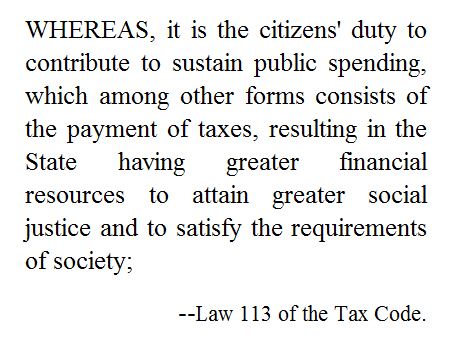
Where does the tax money go?
HAVANA — Every fiscal year, Alejandro Mestre has to “pay for the license plate” and always does it reluctantly, grumbling, because — after paying the 67 pesos due for his Lada 2105 — he cannot understand that the streets continue to be pocked with potholes, even though he and all other drivers pay taxes for ground transportation.
“The state doesn’t explain well how it uses that money,” he says, and adds that this is a constant subject of conversation among drivers: “Everybody wonders the same.”
Among self-employed workers, the situation is similar. A survey by the Center of Studies on the Cuban Economy (CEEC) reveals that, among 300 business owners in Havana, 41 percent of those polled see the taxes only as an obligatory payment to be able to work. Many say that the tax has no reward because they do not relate it to the public services.
That suggests that “there is a great lack of awareness about how public finances work. Which in turn is an indicator of the degree of popular participation and control,” the survey’s authors conclude.
Quite often, the discourse of the revenue service authorities toward taxpayers sounds like a sermon, the way someone tells a child, “behave, do your homework, eat all your food.” Because it is a duty.
However, the same authorities usually skip over the fact that duties are generally accompanied by rights. Ergo, paying taxes is not just a pebble in the shoe; it is also a source of the people’s power.

Technically, we should be able to track down every peso that’s spent or invested, even decide where the Administration pours the common capital. Lawyer and professor Julio Antonio Fernández Estrada explains that the administrative and government agencies don’t necessarily have to account for themselves, which constitutes a problem.
“That [problem] would be solved by the transparency of the data from municipal and provincial governments,” he says. “Everything you need to know about your taxes should be available through computer access.
“It would also be solved by participative budgets: the governments should have their own resources and should determine what to do with them, along with the people. And let [the taxpayers] follow the process so they may know where their money has gone, as happens in many parts of the world.”
As elements of the social contract, taxes lead to two actions: to give and to receive. It is hard to tell someone that his taxes contribute to pay for health care, education, communal services, law and order, and transportation, when those contributions meet with so many difficulties and any improvements turn out to be quite modest. In fact, that’s one of the main causes of tax evasion.
On the other hand, there seems to be a change in formulation, from talking about services that are fully covered by the State to emphasizing the contribution of the people to sustain public spending, as happens now. Saira Pons Pérez, a professor and CEEC researcher, says that the State does not by itself generate value; all revenues, the resources available to a government, come from the people’s labor.

“That can be collected explicitly, through taxes, or implicitly, through lower wages, higher prices,” she explains. “Certainly, the change is there: in making explicit the contribution that the citizens have always made.”
Although until now not all of us pay taxes, some taxes are unforgiving, hiding in a 400-peso salary, in the spurious commercial margin of products sold in convertible pesos (between 10 percent and 240 percent), in the prices of cars, etc.
The communications strategy presented by two functionaries at the National Office of Tax Administration (ONAT) establishes the general objective of contributing to create in the Cuban population a tax culture and a civic awareness on the matter of taxes that will help raise the citizens’ responsibility for the payment of taxes.
“Of course, a lack of tax culture affects not only the taxpayers but also the officials of the internal revenue service, and — inevitably — those who design the policies and laws,” Pons Pérez says. “In all cases, people have little experience, for obvious reasons.
“Even in academia there exists a major theoretical vacuum caused by the lack of public information and studies based on polls that are very difficult to do because of the number of approvals required.”
Besides, the “civic awareness” and the “citizens’ responsibility” do not appear through spontaneous generation. Rather, they are the result of understanding why taxes must be paid and where the benefits lie.
For example, “what would happen if a call is made to the people to give a specific sum of money toward the wages of teachers?” asks Fernández Estrada. “How many people would contribute? Everyone, because that’s better than spending money on tutors or bribing corrupt teachers in pre-university schools.”
The CEEC professor recalls that the tax law was not discussed enough with the population, as was done with the Social Security law and the Labor Code. That debate must transcend mere approval and should be multiplied in popular referenda and studies about the real conditions of the taxpayers that will allow improvements to the law.
One may believe (or not) that his money will be properly utilized. But, because we talk about taxes, the quid is not in the faith but in the certainty — in the information. We can trust, but above all we need to know.
[Front page photo from CUBAHORA]

